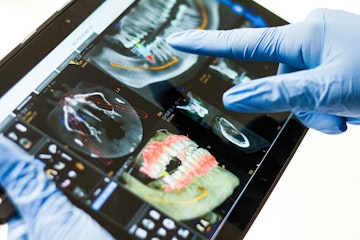
Everything you need to know about All-On‑4 dental system
Until recently, the only way to replace an entire arch of teeth would be to fit a denture. While this might give the aesthetic appearance of having restored your teeth, and you might have some ability to chew food with your denture appliance, there are still lots of limitations to overcome.
Thankfully, innovations in dental treatment mean that this isn’t the only option any longer. The rise of dental implants as a replacement for missing teeth has paved the way for a full arch of teeth to be supported by four to six implants. However, this treatment plan takes a long time and isn’t always suitable for those with lower bone density in the jaw as a result of tooth loss.
This is where the All-On-4 dental system really shines. This innovative treatment plan is quick, highly effective and is designed to last a lifetime. If you’re curious about how All-On-4 dental implants could work for you, read on to learn everything you need to know.
What is All-On-4?
All-On-4 is the name of a treatment plan that uses four dental implants to support an entire arch restoration. Rather than use short implants placed directly into the jaw bone – to replicate the role of a natural tooth root – this system makes use of longer, angled implants.
The main benefit of this simple adaptation is that the angled implants are immediately load-bearing. This means you can complete the treatment much more quickly and start to wear your new permanent denture.
Another benefit is that the longer implants make it possible to have dental implants in cases where there is a loss of bone density. The implants are angled towards the cheek bones to achieve a better hold.
Who can benefit from All-On-4?
If you’re tired of wearing dentures and want to enjoy a full restoration, you could benefit from this treatment plan. While dentures might restore your smile aesthetically, they don’t fully restore function to your jaw. Over time, you can lose bone density in your jaw as the bone is no longer used. This can lead to a sunken appearance that makes you look a lot older.
With dental implants, the force of your bite is distributed into the jaw, which helps to maintain its function, and avoid the risk of further bone loss. It also means that you’ll be able to eat all of your favourite foods again.
You can care for your full arch restoration just as you would with your natural teeth. This means brushing twice a day and visiting the dentist and the dental hygienist for regular checkups and professional cleanings.
What are the disadvantages of this treatment?
Cost is often the most significant downside to this treatment plan. It can be quite a significant investment, and it isn’t available on the NHS. However, we offer payment plans that will allow you to spread the cost of your treatment. This is ideal if you’re on a fixed income and don’t want to have to save up before starting treatment.
Another downside to this treatment is that your gums might be tender after the treatment. While the implants and the arch restoration will be immediately load-bearing, this doesn’t mean it will be comfortable. You will need to go through a period of adjustment as your implants heal and bond with your jawbone. This could mean sticking to soft food or liquids such as soup during the healing period.
Who is a good candidate for treatment?
To be considered for All-On-4 dental implants, you need to have healthy gums and no serious oral health issues that could get in the way of the healing process. Some conditions and medications will make you an unsuitable candidate due to the increased risk of implant failure. Smoking is one lifestyle factor that will rule you out for treatment.
You don’t have to have lost all of your teeth, but you might want to choose extractions for the final teeth in order to make way for the full arch restoration. If you only have a few missing teeth, individual implants or an implant bridge might be a more suitable treatment plan.
And finally, you also need to be willing to follow the aftercare instructions to care for your teeth. This is very important, as there is the risk that bacteria build up in your mouth could lead to inflammation, which could eventually lead to your implants being rejected. To avoid this, you’ll need to follow the aftercare instructions provided by your dental implant dentist.
What are the first steps?
The first step to finding out if you are a good candidate for this treatment is to book a consultation with our team. We’ll carry out a full examination to determine if you could benefit from dental implants, or offer alternative treatment options.
Contact our practice
The Implant and Cosmetic Smiles Clinic
27 Bedford Square,
Houghton Regis,
Dunstable,
LU5 5ES
| Mon | 09:00 - 17:00 |
| Tues | 09:00 - 17:00 |
| Wed | 09:00 - 17:00 |
| Thurs | 09:00 - 17:00 |
| Fri | 09:00 - 16:00 |
| Sat | Closed |
| Sun | Closed |

